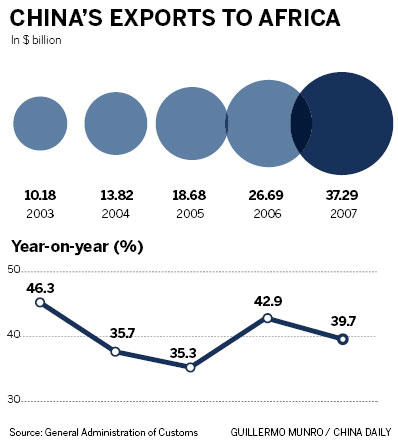Africa, the next frontier for Chinese firms
Updated: 2011-12-09 16:49
By Zhou Siyu (China Daily European Weekly)
|
|||||||||
|
|
Africa promises to be the major hunting ground for Chinese companies as they seek to build on the WTO gains over the next decade.
To some extent African would be essential for Chinese companies as domestic markets are fast becoming saturated, while the developed markets such as the United States and Europe continue to be plagued with financial problems.
Ties between China and African countries have blossomed in recent years especially after China joined the World Trade Organization in 2001. By 2010, China's investments in Africa had reached $1 billion (747 million euros) compared with $100 million in 2001. By the end of 2010, the country's total investment volume in the continent exceeded $10 billion, compared with $490 million by the end of 2003, according to data from the Ministry of Commerce.
Political unrest has often been touted as a major impediment for foreign investment in Africa, but China has shown through several recent moves that it is willing to take the gamble.
|
 |
"The recent unrest in North African nations will only have limited impact on Chinese outbound moves in Africa. There is a bright future ahead for cooperation," said Shu Yunguo, director of the Center of African Studies at Shanghai Normal University.
Though the recent uprisings did have a marginal impact on Chinese investment in some African countries, the situation is now slowly changing as normalcy is returning to most of the regions, say experts.
Libya was a major test case for African investment as several Chinese companies had interests in infrastructure projects. When the political uprising broke out in August, many projects were jeopardized as also factors like payment. Safety concerns also prompted companies to pull out personnel from the war-torn country,.
ZTE Corp, China's second-largest telecom equipment maker, evacuated 88 of its staff members from Libya, but still maintained daily operations with a team of 20 local employees. The company was the largest telecom equipment provider in Libya, and had made investments of 3 billion yuan ($457 million, 352 million euros) since 1999.
Though the war has ended and many companies are contemplating a return to Libya, experts have warned that the time is still not conducive for investment.
Xie Yajing, commercial counselor of the Department of West Asian and African Affairs of the Ministry of Commerce, warned in August that it was still too risky for Chinese companies to make or increase investments in Libya.
Experts, however, feel that the Libyan experience notwithstanding, Chinese companies should turn to other African nations that are less volatile and have a relatively stable political climate.
"I believe there are immense opportunities in African countries," said He Wenping, director of the African Studies Center at the Chinese Academy of Social Sciences.
"But Chinese businesses should have thorough understanding of the local culture, customs and political stability before they decide to make investments," she said.
The rapid development of China's investments in Africa was partly facilitated by China's policy to open up its own markets, said He.
"African nations are keen to attract Chinese investment as it brings with it economic growth prospects, and also provides innumerable jobs for local people," said Shen Danyang, a spokesman for the Ministry of Commerce during a forum at the 15th China International Fair for Investment and Trade in Xiamen, Fujian province.
Yang Lihua, director of the Center of Southern African Studies at the Chinese Academy of Social Sciences, said that China's investments in South Africa have put the African nation on the high road to growth.
"Besides more jobs and better infrastructure, Chinese companies have also brought in rich experiences and advanced technologies in manufacturing and processing," she said during a recent interview.
"Chinese companies should blend more closely with the local community and be involved in more corporate social responsibility programs," said Shu from the Shanghai Normal University.
Companies also need to step up efforts to improve product quality so that reputations can be enhanced, said He from the Chinese Academy of Social Sciences.












